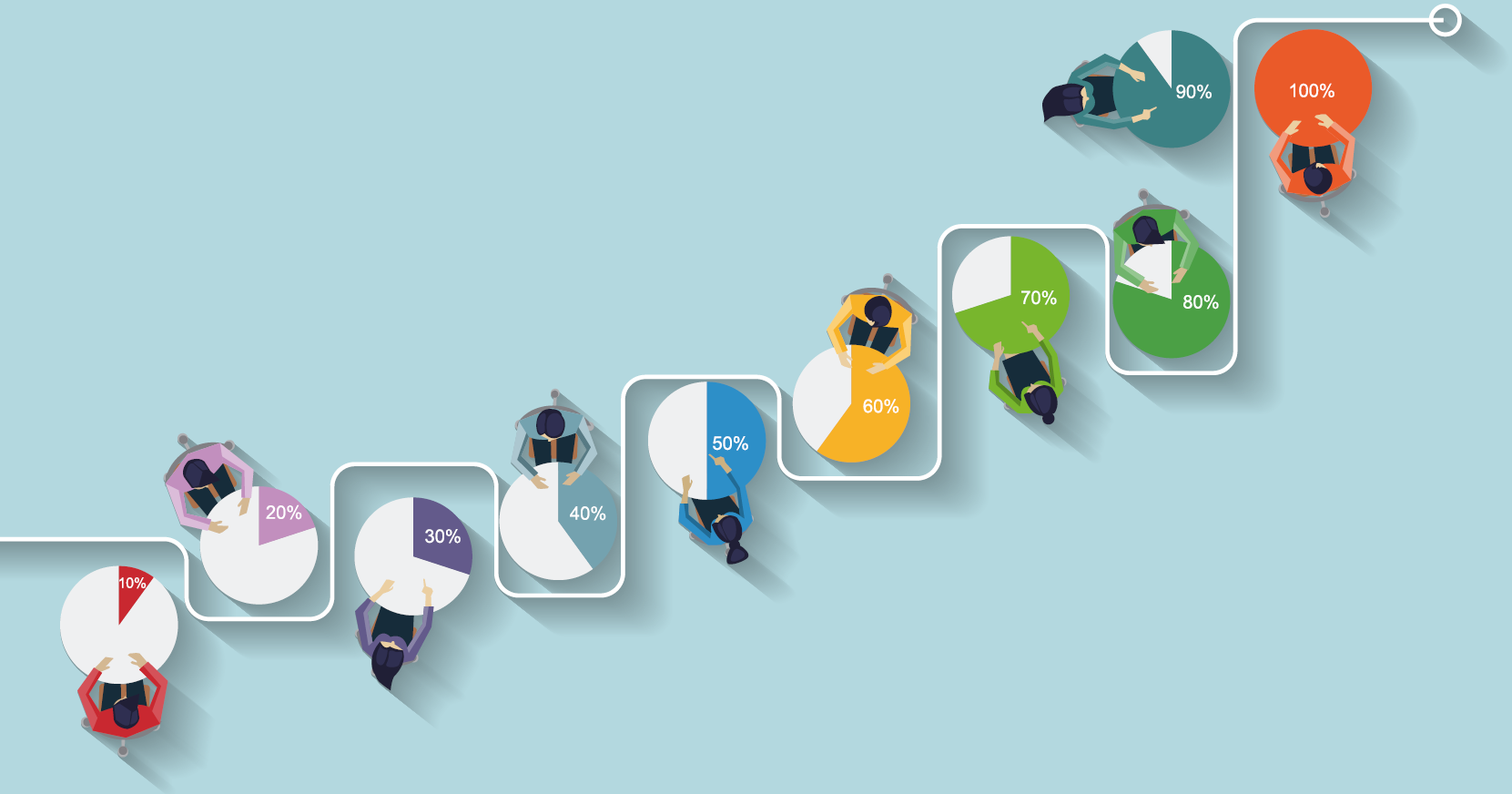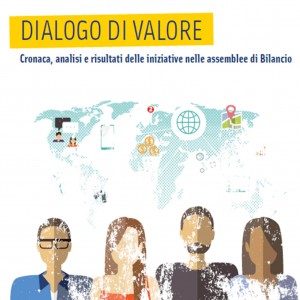What is engagement in the world of investment? By the term engagement we refer to the activity of dialogue between investors and businesses and the exercise of voting rights in relation to our equity investments.
The aim of engagement is to establish a continuous and constructive dialogue over time on the questions of sustainability and social responsibility.

Engagement activities in 2017
Let us look in detail at how Etica Sgr engagement developed in 2017.
Voting: shareholder activism
 In 2017 Etica Sgr directed its shareholder activism at 17 firms, of which 11 Italian, 3 Japanese and 3 American. Etica Sgr is committed to physically attending the shareholders’ meetings of all Italian companies in which its funds invest. This is a vital aspect of building an increasingly fruitful dialogue with the boards of directors.
In 2017 Etica Sgr directed its shareholder activism at 17 firms, of which 11 Italian, 3 Japanese and 3 American. Etica Sgr is committed to physically attending the shareholders’ meetings of all Italian companies in which its funds invest. This is a vital aspect of building an increasingly fruitful dialogue with the boards of directors.
Particular attention was given to the sphere of governance in relation to the following issues:
- Gender diversity in terms of the number of women on boards of directors;
- Remuneration policy;
- Independence of the members of the Board of Directors;
- Policy on dividends;
- Purchase of own shares.
Dialogue with the companies
 Etica Sgr’s dialogue activities set out to influence and drive businesses towards best practices and sustainable behaviours.
Etica Sgr’s dialogue activities set out to influence and drive businesses towards best practices and sustainable behaviours.
This is why activism is not limited to the companies in which the funds invest or which make up the Investable Universe.
Dialogue can go beyond this to involve other firms, especially together with international networks of responsible investors with whom Etica Sgr collaborates. The strategic areas of dialogue that Etica Sgr has identified are:
-
-
- Climate change.
- Human rights in the supply chain.
- Tax optimization.
-
Why does Etica Sgr believe in engagement?
Etica Sgr has always been committed to furthering sustainable and responsible investment and views engagement as an indispensable and strategic part of its work. Engagement is not limited to the shareholders’ meetings at which we exercise our voting rights, but is built by continual dialogue throughout the year. We use precise targets to measure progress over time, through a patient process of pointing out to firms the opportunities, even in business terms, of increasingly responsible behaviour, adapting corporate practices to ongoing environmental and social change.

Our efforts are aimed primarily at urging them to think about and act on environmental, social, governance issues, and for this reason we try to take the path towards improvement together with our corporate interlocutors. This is especially important today, when governments, companies and the public are called to do more to achieve sustainable development.
The importance of this area for Etica Sgr was confirmed by the creation in 2018 of the Corporate Engagement and Network Manager to oversee the work on sustainability carried out by Etica Sgr either independently or together with the national and international networks to which it belongs.
Etica Sgr, engagement and SDGs: united we are stronger
At 2017 shareholders’ meetings Etica Sgr chose for the first time to associate the issues addressed in our engagement activity with the United Nations Sustainable Development Goals to try and stimulate dialogue with firms on the broader, globally shared question of sustainable development.
These Goals commit the governments of the 193 Member States of the United Nations to promote sustainable development around the planet, touching issues such as health, education, gender equality, combating famine and poverty and environmental safeguards.
What are the main issues tackled by Etica Sgr?
To learn more, click on the following items.
The question of corporate governance covers issues such as the independence of the Board of Directors, the separation of the Chairman of the Board and the Chief Executive Officer/Managing Director, the gender diversity of the board and remuneration systems.
These issues are central to Etica Sgr’s analyses because a well governed company is more likely to achieve strong financial results in the long-term.
GOAL 5: Gender equality
![]() Achieve gender equality and emancipate all women and girls. The principal barrier to change is the persisting gender gap, seen in the fact that women are often still under represented in managerial positions or paid less for doing the same job.
Achieve gender equality and emancipate all women and girls. The principal barrier to change is the persisting gender gap, seen in the fact that women are often still under represented in managerial positions or paid less for doing the same job.
GOAL 8: Decent work and economic growth
Incentivise lasting, inclusive and sustainable economic growth, full and productive employment and decent jobs for everyone.
Regarding Sustainable Development Goal number 8, Etica Sgr has been actively involved in the governance issues relating to corporate remuneration.
GOAL 12: Responsible consumption and production
Ensure sustainable consumption and production patterns. One of the aims of Sustainable Development Goal number 12 is to encourage businesses, in particular large multinationals, to include information on sustainability in its annual statements.
Etica Sgr has long taken an active interest in climate change, excluding from its investments those industries with a particular impact in terms of gas emissions such as petroleum or mining, preferring to invest in environmentally friendly companies. Etica Sgr’s engagement activity reinforces and amplifies its efforts as a sustainable and responsible investor, encouraging the companies in which it invests to adopt more efficient strategies in line with the Sustainable Development Goals linked to climate change.
GOAL 6: Clean water and sanitation
Ensure that sustainable water management and hygiene/sanitation systems are available to everyone. The United Nations is calling for a more responsible use of water resources. The goal is to achieve adequate and fair access to hygiene and sanitation for everyone, reduce pollution and protect and restore water-related ecosystems.
GOAL 13: Climate Action
Promote action to combat climate change at every level. Climate change is a global challenge that knows no bounds. Greenhouse gas emissions caused by human activity are currently at their highest levels in history. Against this background Etica Sgr is committed to driving companies towards a low carbon economy, pressing for emissions reporting and reduced consumption, and the development of renewable energies.
GOAL 15: Life on land
Protect, restore and encourage sustainable use of the ecosystem and forest management, combat desertification, arrest land degradation, and halt biodiversity loss. The United Nations believes that it is important to mobilize sizeable financial resources to preserve biodiversity and ecosystems. Etica Sgr is therefore urging companies to adopt responsible wood procurement policies, reduce deforestation by suppliers of palm oil and policies that are friendly to wild animals.
The question of human rights is of vital importance, especially in countries with slack legislation, where many businesses often operate through their suppliers. Etica Sgr has always focused attention on respect for human rights in the selection and monitoring of the supply chains of the businesses in which it invests. Engagement activism tries to raise awareness among company boards of the values of social and environmental responsibility also with respect to their suppliers. It is important to incentivise the monitoring of internal processes through for example supply chain audits to prevent episodes of discrimination or exploitation like child or forced labour.
GOAL 8: Decent work and economic growth
Incentivise lasting, inclusive and sustainable economic growth, full and productive employment and decent jobs for everyone. For Etica Sgr a sustainable supply chain is both necessary and at the same time extremely rewarding. Etica Sgr occupies the front line in campaigns against human rights violations, drawing firms’ attention to their supply chain policies and recruitment practices to protect respect for the environment and human rights along the whole chain.
GOAL 16: Peace, justice and strong institutions
Promote peaceful and more inclusive societies for sustainable development; offer access to justice for all and create efficient, responsible and inclusive bodies at every level. The United Nations is calling for governments to reduce illicit flows of finance and weapons and step up measures to combat all forms of organized crime by 2030. It is vital that national institutions are strengthened, even through international cooperation, to enable them to prevent violence and combat terrorism and crime.
Investors are increasingly taking an interest in the conduct of the companies in which they invest. As a consequence, companies have a strategic interest in reconciling economic growth with a fair distribution of resources, managing their tax affairs transparently and in accordance with the law, adequately rewarding all stakeholders, and fully disclosing all their activities.
GOAL 10: Reduced inequality
Reduce inequality within and among countries. Reducing national and international inequality is probably one of the world’s most challenging goals, because the poorest countries have few means available to improve their situation. Sustainable Development Goal 10 draws attention to this issue measured by various indicators including the social, economic and political inclusion of citizens. Reducing inequality is also especially important in that, beyond a certain threshold, it is damaging to economic growth.
Do you want to find out more? Download the complete Engagement Report.
Engagement Engagement report ESG







